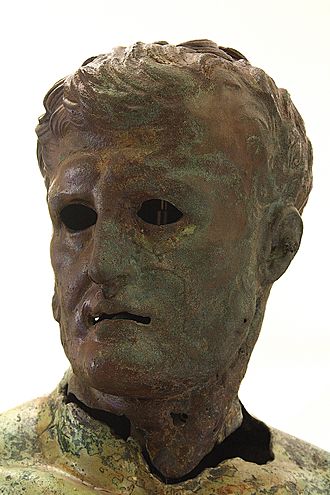Lucius Aemilius Paullus Macedonicus facts for kids
Quick facts for kids
Lucius Aemilius Paullus Macedonicus
|
|
|---|---|

Bronze sculpture identified as Lucius Aemilius Paullus, c. 167 BC
|
|
| Born | c. 229 BC |
| Died | 160 BC |
| Nationality | Roman |
| Office | Consul (182, 168 BC) |
| Children | |
| Military service | |
| Battles/wars | Third Macedonian War ● Battle of Pydna |
| Awards | Triumph |
Lucius Aemilius Paullus Macedonicus (born around 229 BC – died 160 BC) was an important Roman general and politician. He served as a consul (a top leader) twice. He is most famous for conquering Macedon during the Third Macedonian War.
Contents
Who Was Lucius Aemilius Paullus?
Lucius Aemilius Paullus came from a very old and powerful Roman family called the Aemilii Paulii. His family was part of the patrician class, which meant they were from the original noble families of Rome. His father, also named Lucius Aemilius Paullus, was a consul who died in a famous battle called the Battle of Cannae.
Early Steps in His Career
After serving in the Roman army, Paullus began his political journey. This path was called the cursus honorum. It was a set order of public offices that Roman politicians had to follow.
He was elected a military tribune, which was an army officer role. Then, in 193 BC, he became a curule aedile. This job involved managing public games and city services.
Next, in 191 BC, he was elected praetor. A praetor was a high-ranking judge or military commander. During this time, he fought against the Lusitanians in the Hispania provinces (modern-day Spain).
Even though he was successful, it took him several years to become a consul. Finally, in 182 BC, he was elected consul for the first time. He later commanded an army in 181 BC against a group called the Ingauni in Liguria (part of modern Italy).
Winning the Macedonian War
The Third Macedonian War started in 171 BC. The king of Macedon, Perseus of Macedon, had defeated a Roman army. For two years, neither side could win decisively.
In 168 BC, Paullus was elected consul again. The Senate gave him the job of ending the war with Macedon. He quickly proved his skill. On June 22, he led the Roman army to a major victory at the Battle of Pydna.
This battle was a huge win for Rome. King Perseus of Macedon was captured, and the Third Macedonian War ended.
After his victory, in 167 BC, Paullus was ordered by the Senate to return to Rome. First, he had to go through Epirus, a kingdom that Romans suspected of helping Macedon. He ordered his army to take goods from seventy towns there, and many people were captured.
A Great Triumph and Later Life
Paullus's return to Rome was a huge celebration. He brought back immense riches from Macedon and Epirus. He celebrated a spectacular triumph, which was a grand parade to honor a victorious general.
The captured King Perseus and his sons were part of this parade. This event marked the end of the Antigonid dynasty, the ruling family of Macedon. To honor his victory, the Senate gave Paullus the special nickname (called an agnomen) Macedonicus. This meant "Conqueror of Macedon."
This was the highest point of his career. In 164 BC, he was elected censor. A censor was a powerful official who kept track of citizens and public morals. Paullus became ill and died in 160 BC while still serving as censor.
His Family and Adoptions
Lucius Aemilius Paullus had a complex family life. His father died when Paullus was young. Paullus was married twice. From his first marriage, he had four children: two sons and two daughters. He later divorced his first wife.
He then married a second time and had two more sons and another daughter. With six children, Paullus had many heirs. To help his older sons have good careers, he decided to have them adopted into other powerful Roman families.
His oldest son was adopted into the Fabia family and became Quintus Fabius Maximus Aemilianus. His second son was adopted by his cousin, Publius Cornelius Scipio, the son of the famous general Scipio Africanus. This son became Publius Cornelius Scipio Aemilianus. Through these adoptions, his sons joined two of Rome's most influential families.
Sadly, Paullus's two younger sons, whom he had hoped would carry on his own family name, died young. This happened around the same time he celebrated his great triumph.
When Paullus died, his adopted sons, Quintus Fabius Maximus Aemilianus and Publius Cornelius Scipio Africanus Aemilianus, inherited his property. Even though they were no longer legally Aemilii Paulli, they still honored their birth father.
Paullus's first wife, Papiria Masonia, outlived him. His daughters also married into important Roman families. One daughter married into the Aelius family, and another, Aemilia Paulla Tertia, married the son of Cato the Elder, a very famous Roman politician.
See also
 In Spanish: Lucio Emilio Paulo Macedónico para niños
In Spanish: Lucio Emilio Paulo Macedónico para niños
- Aemilia gens
- Scipio-Paullus-Gracchus family tree
- Monument of Aemilius Paullus
 | Isaac Myers |
 | D. Hamilton Jackson |
 | A. Philip Randolph |

